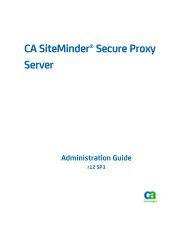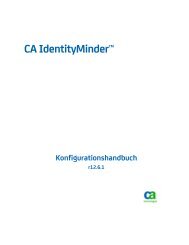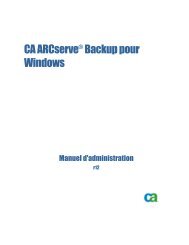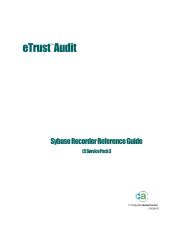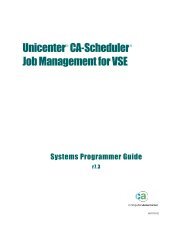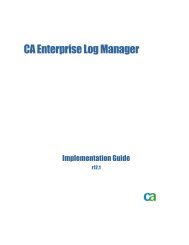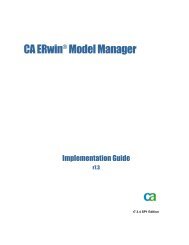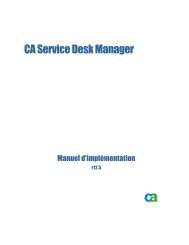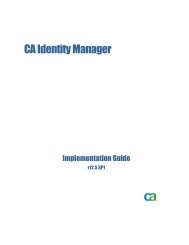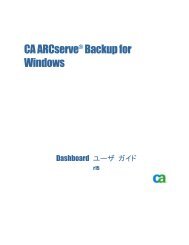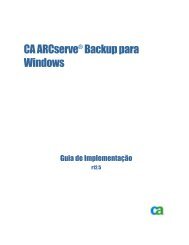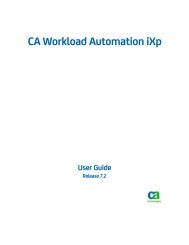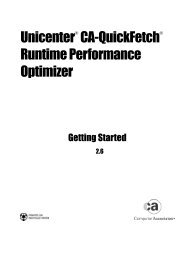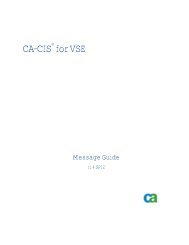- Page 1 and 2:
Unicenter ® CA-Scheduler ® Job Ma
- Page 3 and 4:
Contents Chapter 1. Introduction .
- Page 5 and 6:
3.13.1.2 ALTer or REPlace an Auto-R
- Page 7:
7.1.2.1 Example 1 . . . . . . . . .
- Page 10 and 11:
1.1 Beginning with the Basics 1.1 B
- Page 12 and 13:
1.1 Beginning with the Basics To sh
- Page 14 and 15:
1.1 Beginning with the Basics This
- Page 16 and 17:
1.2 How Unicenter CA-Scheduler Work
- Page 18 and 19:
1.2 How Unicenter CA-Scheduler Work
- Page 20 and 21:
1.3 Additional Features ■ Which j
- Page 22 and 23:
1.4 Summing Up 1.4 Summing Up The f
- Page 24 and 25:
2.1 Getting Started 2.1 Getting Sta
- Page 26 and 27:
2.1 Getting Started SCHD-MM MAIN
- Page 28 and 29:
2.1 Getting Started 2.1.4 Logging O
- Page 30 and 31:
2.2 Maintaining Stations SCHD-WM S
- Page 32 and 33:
2.2 Maintaining Stations SCHD-UTIL
- Page 34 and 35:
2.2 Maintaining Stations To submit
- Page 36 and 37:
2.2 Maintaining Stations SCHD-WM S
- Page 38 and 39:
2.2 Maintaining Stations SCHD-WM S
- Page 40 and 41:
2.2 Maintaining Stations SCHD-WD S
- Page 42 and 43:
2.3 Maintaining User Records 2.3 Ma
- Page 44 and 45:
2.3 Maintaining User Records SCHD-
- Page 46 and 47:
2.3 Maintaining User Records To All
- Page 48 and 49:
2.3 Maintaining User Records Unicen
- Page 50 and 51:
2.3 Maintaining User Records Users
- Page 52 and 53:
2.3 Maintaining User Records SCHD-
- Page 54 and 55:
2.3 Maintaining User Records Option
- Page 56 and 57:
2.3 Maintaining User Records If use
- Page 59 and 60:
Chapter 3. Maintaining the Database
- Page 61 and 62:
3.1 Defining Schedules ■ ■ ■
- Page 63 and 64:
3.1 Defining Schedules AUTO SELECT
- Page 65 and 66: 3.1 Defining Schedules 3.1.3 Checki
- Page 67 and 68: 3.1 Defining Schedules Option Purpo
- Page 69 and 70: 3.1 Defining Schedules 3.1.4.2 When
- Page 71 and 72: 3.1 Defining Schedules Sequence By
- Page 73 and 74: 3.1 Defining Schedules If your site
- Page 75 and 76: 3.1 Defining Schedules A Value Of U
- Page 77 and 78: 3.2 Defining Optional Schedule Reco
- Page 79 and 80: 3.2 Defining Optional Schedule Reco
- Page 81 and 82: 3.2 Defining Optional Schedule Reco
- Page 83 and 84: 3.2 Defining Optional Schedule Reco
- Page 85 and 86: 3.2 Defining Optional Schedule Reco
- Page 87 and 88: 3.3 Copying Schedules 3.3 Copying S
- Page 89 and 90: 3.3 Copying Schedules To Copy A Sch
- Page 91 and 92: 3.4 Displaying Schedules SCHD-SU S
- Page 93 and 94: 3.4 Displaying Schedules PRESS ENTE
- Page 95 and 96: 3.5 Deleting Schedules SCHD-SD SC
- Page 97 and 98: 3.5 Deleting Schedules If you are n
- Page 99 and 100: 3.6 Analyzing Schedules SCHD-UTIL
- Page 101 and 102: 3.6 Analyzing Schedules Unicenter C
- Page 103 and 104: 3.7 Automatic Console Replies for S
- Page 105 and 106: 3.7 Automatic Console Replies for S
- Page 107 and 108: 3.7 Automatic Console Replies for S
- Page 109 and 110: 3.8 Summary of Schedule Maintenance
- Page 111 and 112: 3.9 Defining Jobs 3.9 Defining Jobs
- Page 113 and 114: 3.9 Defining Jobs SCHD-JU JOB DEF
- Page 115: 3.9 Defining Jobs SCHD-JM JOB MAIN
- Page 119 and 120: 3.9 Defining Jobs The chart precedi
- Page 121 and 122: 3.9 Defining Jobs those with earlie
- Page 123 and 124: 3.9 Defining Jobs 3.9.3.5 What JCL
- Page 125 and 126: 3.9 Defining Jobs If You Have multi
- Page 127 and 128: 3.9 Defining Jobs ■ ■ ■ ■ O
- Page 129 and 130: 3.9 Defining Jobs When you are read
- Page 131 and 132: 3.9 Defining Jobs If You Want Notif
- Page 133 and 134: 3.9 Defining Jobs If You Want To Se
- Page 135 and 136: 3.9 Defining Jobs The Job Criteria
- Page 137 and 138: 3.9 Defining Jobs The criteria stat
- Page 139 and 140: 3.9 Defining Jobs ■ MAXIMUM TIMEs
- Page 141 and 142: 3.9 Defining Jobs DESTINATIONS and
- Page 143 and 144: 3.9 Defining Jobs For These Message
- Page 145 and 146: 3.9 Defining Jobs To Separate All J
- Page 147 and 148: 3.9 Defining Jobs 3.9.4.6 Defining
- Page 149 and 150: 3.10 Displaying and Updating a Job
- Page 151 and 152: 3.10 Displaying and Updating a Job
- Page 153 and 154: 3.10 Displaying and Updating a Job
- Page 155 and 156: 3.11 Deleting Job Records 3.11 Dele
- Page 157 and 158: 3.11 Deleting Job Records SCHD-JM
- Page 159 and 160: 3.12 Analyzing Jobs 3.12 Analyzing
- Page 161 and 162: 3.12 Analyzing Jobs To display a fu
- Page 163 and 164: 3.13 Automatic Console Replies for
- Page 165 and 166: 3.13 Automatic Console Replies for
- Page 167 and 168:
3.13 Automatic Console Replies for
- Page 169 and 170:
3.14 Summary of Job Maintenance 3.1
- Page 171:
3.14 Summary of Job Maintenance To
- Page 174 and 175:
4.1 Online Monitoring Panel 4.1 Onl
- Page 176 and 177:
4.1 Online Monitoring Panel This ch
- Page 178 and 179:
4.2 Displaying Status Schedules and
- Page 180 and 181:
4.2 Displaying Status The table fol
- Page 182 and 183:
4.2 Displaying Status To Restrict T
- Page 184 and 185:
4.2 Displaying Status 4.2.4.1 Defau
- Page 186 and 187:
4.2 Displaying Status SCHD-CP SCHE
- Page 188 and 189:
4.2 Displaying Status If the schedu
- Page 190 and 191:
4.2 Displaying Status or backlogged
- Page 192 and 193:
4.2 Displaying Status The last two
- Page 194 and 195:
4.2 Displaying Status WAITING FOR S
- Page 196 and 197:
4.3 Handling Messages If your messa
- Page 198 and 199:
4.4 Handling Predecessor Conditions
- Page 200 and 201:
4.5 Handling Global Parameters 4.5.
- Page 202 and 203:
4.7 Displaying Data Set Mask Names
- Page 204 and 205:
4.9 Controlling Schedules 4.9 Contr
- Page 206 and 207:
4.10 Controlling Jobs 4.10 Controll
- Page 208 and 209:
4.10 Controlling Jobs Enter RELE CA
- Page 210 and 211:
4.10 Controlling Jobs SCHD-DADP D
- Page 212 and 213:
4.11 Summing Up To Specify Abbrevia
- Page 214 and 215:
4.11 Summing Up This Command Affect
- Page 216 and 217:
The criteria language uses three ty
- Page 218 and 219:
5.1 Criteria Vocabulary job. Normal
- Page 220 and 221:
5.1 Criteria Vocabulary Example SCD
- Page 222 and 223:
5.1 Criteria Vocabulary Given the e
- Page 224 and 225:
5.2 Calendar Mechanisms 5.2 Calenda
- Page 226 and 227:
5.2 Calendar Mechanisms 5.2.2.1 Wor
- Page 228 and 229:
5.2 Calendar Mechanisms Suppose you
- Page 230 and 231:
5.2 Calendar Mechanisms datetable o
- Page 232 and 233:
5.2 Calendar Mechanisms The panel f
- Page 234 and 235:
5.3 Some Examples 5.3 Some Examples
- Page 236 and 237:
5.3 Some Examples Example 7 A payro
- Page 238 and 239:
5.3 Some Examples ■ ■ If the la
- Page 240 and 241:
5.4 What Is Wrong with These Exampl
- Page 242 and 243:
5.4 What Is Wrong with These Exampl
- Page 245 and 246:
Chapter 6. Tips This topic of the m
- Page 247 and 248:
6.1 Commonly Asked Questions 6.1.1.
- Page 249 and 250:
6.1 Commonly Asked Questions Keep i
- Page 251 and 252:
6.1 Commonly Asked Questions 6.1.2.
- Page 253 and 254:
6.1 Commonly Asked Questions To all
- Page 255 and 256:
6.1 Commonly Asked Questions For de
- Page 257 and 258:
6.1 Commonly Asked Questions use of
- Page 259 and 260:
6.1 Commonly Asked Questions 6.1.4
- Page 261 and 262:
6.1 Commonly Asked Questions If the
- Page 263 and 264:
6.1 Commonly Asked Questions Status
- Page 265 and 266:
6.2 Pitfalls predecessor criteria o
- Page 267 and 268:
Chapter 7. Techniques This chapter
- Page 269 and 270:
7.1 On-Request Schedules and Jobs 7
- Page 271 and 272:
7.1 On-Request Schedules and Jobs 7
- Page 273 and 274:
7.1 On-Request Schedules and Jobs W
- Page 275 and 276:
7.2 Backlogged Work completes on We
- Page 277 and 278:
7.3 Issuing Online Commands in Batc
- Page 279 and 280:
7.3 Issuing Online Commands in Batc
- Page 281 and 282:
7.3 Issuing Online Commands in Batc
- Page 283 and 284:
7.4 Restart/Recovery of Scheduled J
- Page 285 and 286:
7.5 Multiple CPU Considerations 7.5
- Page 287 and 288:
7.5 Multiple CPU Considerations Nor
- Page 289 and 290:
7.5 Multiple CPU Considerations exe
- Page 291 and 292:
7.5 Multiple CPU Considerations CAJ
- Page 293 and 294:
7.6 NJE Processing In the preceding
- Page 295 and 296:
7.6 NJE Processing 7.6.2.1 NJE Job
- Page 297 and 298:
7.6 NJE Processing 7.6.4 Installati
- Page 299 and 300:
7.6 NJE Processing Status BUSY Mean
- Page 301 and 302:
7.7 Summing Up Prefix PW DM Transac
- Page 303 and 304:
Glossary This glossary defines term
- Page 305 and 306:
documentation batch command. A comm
- Page 307 and 308:
Unicenter CA-Scheduler uses when or
- Page 309 and 310:
The payroll department's month-end
- Page 311 and 312:
Index Special Characters "Who is lo
- Page 313 and 314:
Commands (continued) operator (cont
- Page 315 and 316:
F FAIL CODE field 7-16 FAILED queue
- Page 317 and 318:
MBR SUBID field 3-65 MCPU installat
- Page 319 and 320:
Predecessors (continued) types (con
- Page 321 and 322:
Scheduling (continued) jobs 1-5, 5-
- Page 323:
User (continued) authority levels 2



